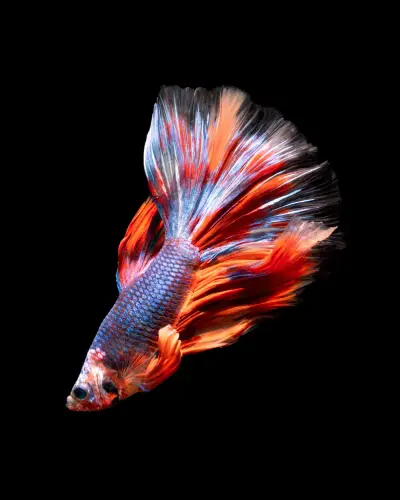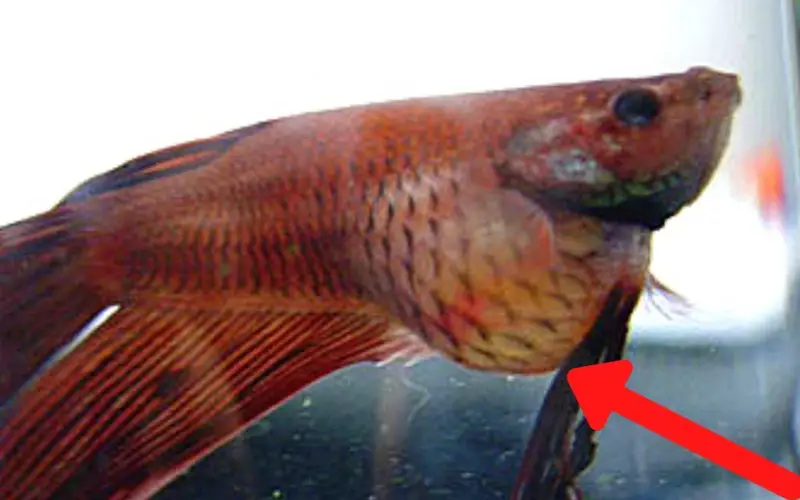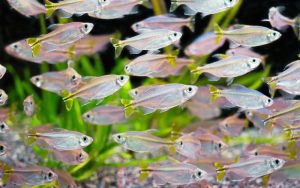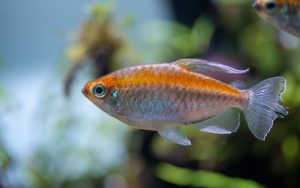is my betta constipated? A betta fish suffering from constipation or Dropsy can have similar symptoms, and it can be difficult to tell the difference between Dropsy or constipation betta.
While both conditions can lead to systemic complications and even death if not appropriately managed, their causes vary greatly.
Fortunately, with the correct diagnosis and proper actions, dropped bettas often fully recover as long as corrective steps are handled promptly.

In this bloated Betta vs dropsy blog post, we’ll discuss the difference between dropped bettas and those that are constipated and provide several treatment options for each ailment.
Learn more about detecting which health issue may be plaguing your freshwater fish and how best to treat them!
Table of Contents
ToggleWhy Is My Betta Fish Pineconing?
Betta pineconing but not bloated is one of the first signs that a betta has Dropsy. This condition is commonly identified by its namesake – when the scales of your betta fish become raised and look like a pinecone, it’s likely Dropsy.
Additionally, your Betta’s stomach may have swim bladder disease, causing your betta fish bloated and pale. If this is the case, you should also be able to observe a protruding spine.
Does My Betta Have Dropsy or Just Fat?
While it can be challenging to identify whether your Betta has Dropsy or is just fat, there are a few key signs that you can look out for.
To start, observe the overall appearance of your bloated betta fish – Dropsy causes scale protrusion along with a bloated belly. In contrast, an overweight fish will have bulging sides which extend outside the “shoulders.”

If your Betta’s sides bulge outside their shoulders, they may be too heavy and not necessarily suffer from Dropsy. Additionally, check for any thinning of the fins – this is usually indicative of fluid buildup due to disease.
Finally, look for any other outward symptoms, such as difficulty breathing or changes in scale coloration which could indicate an underlying health issue.
Ultimately when determining if your fish has Dropsy or if it’s just fatness, it’s best to consult with a qualified veterinarian experienced in aquatic medicine who can provide you with more detailed advice related to the health of your fish.
What Are the Causes of Betta Fish Bloat?
Betta fish bloat is a common health issue encountered by Betta owners. Bloating occurs when the Betta fish digestive system becomes overwhelmed due to poor water quality, overfeeding, or other environmental factors. Common causes of bloating include:
Poor Water Quality
Dirty water with high levels of ammonia and nitrates can cause Betta fish to become bloated as their bodies cannot process the toxins in lower-quality aquaria environments. Proper filtration and regular (weekly) tank cleaning/water changes will help maintain high-quality water for your Betta fish.
Overfeeding
An increased amount of food can overwhelm the digestion system, causing bloating and potentially fatal gaseous distention that may be difficult to treat once it has occurred. Always follow instructions on how much food should be given your Betta daily; typically, two feedings consisting of no more than two pellets or one freeze-dried mealworm twice a day is sufficient for an adult betta’s diet.
Unsuitable Tank Mates
Housing incompatible tank mates with violent behaviors such as fin nipping can force different waste products into the environment; this could result in digestive issues, including bloat, if not addressed quickly enough by changing out some of the aquarium’s contents or resetting its ecosystem completely via partial water change and filter maintenance.
Parasites & Disease
When left untreated, certain parasites such as flukes are known to cause bloating in bettas due to them clogging up their intestines but also interference with organ functionality that may lead to a weakened immune system
Swim Bladder Disease
Swim bladder disorder is an example of a more severe condition that can cause bloating, which may require antibiotics or other prescribed medications to resolve. Dropsy, as mentioned before, is an extreme form of bloating that can develop from an untreated fish’s swim bladder disorder.
Therefore, it is essential to be aware of the signs of swim bladder disease and seek medical advice if your Betta displays symptoms such as difficulty in swimming or buoyancy issues.
And hence lowered ability against further pathogen invasion, which could potentially mount buildups within their bellies, resulting in bloating if not treated fast enough through quarantine practices from affected fishes combined with anti-pest medication application into the habitat itself.
Followed through proper betta fish constipation treatment plans prescribed by qualified aquatic veterinarians or specialized aquarists for maximum effectiveness against any diseases present within your Betta’s immediate environment.
What Are the Differences Between Bloat and Dropsy?
How Can You Tell the Difference Between Constipation and Dropsy? is it betta dropsy or constipation? There are some differences between bloat and Dropsy. Unlike Dropsy, it’s caused by Aeromonas bacteria which causes infections. Both have the commonality of needing early diagnosis.
The most apparent difference is environmental factors, such as poor water quality or overfeeding, can cause that bloat. Dropsy, on the other hand, is caused by a bacterial infection and requires medical intervention.
In terms of how to tell the difference between constipation and Dropsy, Here are a few key points that can help you do just that.
Bloated Betta vs Dropsy Comparison Table : (dropsy vs bloat)
This table provides a comparison table to assist readers with understanding how Bloat and Dropsy are in Betta fish.
| Feature | Bloated Betta | Dropsy |
|---|---|---|
| Appearance | Mild swelling, especially in the abdomen. Scales may appear slightly raised, but not pineconing. | Severe swelling throughout the body, including the abdomen, eyes, and gills. Scales raised and pointed, giving a “pinecone” appearance. |
| Behavior | May be lethargic or have decreased appetite, but usually still active and swimming normally. | Very lethargic, often lying on the bottom of the tank or gasping for air at the surface. May lose appetite completely. |
| Cause | Usually caused by overfeeding, constipation, or a minor internal infection. | Caused by organ failure, usually due to a serious bacterial infection, parasite, or tumor. |
| Treatment | Fasting for 24-48 hours, followed by a high-quality diet and improved water quality. Epsom salt baths may also be helpful. | Antibiotics, epsom salt baths, and aquarium salt baths may be used, but prognosis is often poor. |
| Prognosis | Good with early intervention and proper care. | Poor. Dropsy is often fatal, even with treatment. |
It is important to note that this is just a general comparison table, and there can be some variation in symptoms between individual fish. If you are concerned that your betta fish may be sick, it is always best to consult with a veterinarian or experienced aquarist.
Dropsy or Constipation Betta Differences
Dropsy and constipation are terms used to describe medical conditions in Betta fish; although they share some similarities, they have distinct differences.
Dropsy is caused by a bacterial infection that causes the fish’s body to swell due to fluid buildup. Constipation is caused by a lack of fiber and poor water quality, which can cause the fish’s intestines to become blocked or impacted.
Dropsy generally results in physical symptoms such as bloating of the body. Its scales stand out (a condition known as “pineconing”), darkening of coloration due to ash-like residue collecting on the skin, rapid breathing or gasping for air at surface level with eyes bulging outward from the face, loss of appetite, and secondary fungal infections near dorsal fin area.
In contrast, constipation usually presents itself more slowly than Dropsy.
Common signs include clamped fins (a sign of discomfort), lethargy, failure to feed normally, or complete lack of appetite for food even when offered favorite foods, stringy feces hanging from the anal vent area after being inactive for long periods before revisiting substrate bottom.
Typically with difficulty swimming properly soon afterward if not relieved shortly after that by either fasting method administration or medications/herbal treatments if recommended/deemed necessary.
Ultimately it’s important to keep your Betta healthy through good husbandry practices, including regular water changes using high-quality aquarium filters rated correctly given their tank size(s).
Also, providing a varied diet with some occasional treats that are protein-based food or mosquito larvae can keep them active and their digestive systems functioning correctly without any issues.
Bloating in Betta fish is often preventable if nutrition and water quality are appropriately maintained to avoid the above conditions.
Symptoms of Constipation in Bettas
If your betta fish is showing signs of constipation. We suggest you notice every fish’s symptoms because he can develop other ailments much bigger than constipation.
As in all fish diseases, the earlier you find the illness, the better the treatment. Below are some typical betta-induced betta constipation symptoms.
Loss of Appetite
Betta fish are often picky eaters, but their greed is notorious after finding food they like. When the fish does not spit out food, the bowels become full. It is also important not to assume your fish is constipated just because it is a symptom.
Pale, Stringy Feces
Healthy urine is dark brown and sinks quickly on the body’s surface. However, constipated betta fish poop may be pale in color and strings, often staying attached to the fish and trailing back during the water movement.
Trouble Swimming
Constipation in betta fish may cause better difficulties in swimming. If so, treat Betta as quickly as possible because it will probably make him extremely uncomfortable.
Those signs may come from something other than an illness in the Betta. Read this article on what diseases and conditions your Betta may suffer from.
What to Do If Betta Constipated?
How to treat betta constipation? If you think your Betta is constipated, there are a few steps you can take to help the situation.
- First, try fasting the fish for a day or two. During this time, do not offer food so your Betta’s digestive system can rest and reset.
- You can also give your Betta live food such as bloodworms, daphnia, or brine shrimp to help clean the fish’s bowels.
- Finally, consider buying a medication specifically designed to treat constipation in bettas. This will help get your fish back on track.
Remember, prevention is always the best medicine! Ensure your Betta has a healthy diet and use aquarium filters with the correct rating for your tank size(s).
If you are ever in doubt, it is best to contact a veterinarian who specializes in fish health to get the best advice and treatment for your pet.
How Do You Treat a Constipated Betta Fish?
How to treat a constipated betta fish? Betta Constipation Treatment: Bettas are a popular type of fish, but they can get constipated. If your betta fish is constipated, it can be uncomfortable and lead to other health problems.
Betta Fish Constipation: How to Diagnose, Avoid and Solve It!
There are several ways to diagnose and treat constipation in your betta fish. First, you should monitor how often your fish passes stool. If it’s been two or more days since the last time you saw a release of waste from your Betta, it could be constipated.
If there is a decrease in appetite, loss of energy, and noticeable signs of stress, then it’s time to take action.
In this video, you will learn how to diagnose, avoid and solve betta fish constipation. You will also learn about the best food and water conditions for keeping your Betta healthy and happy.
Thankfully, constipation can usually be cured with simple solutions such as fasting or adding a grain of aquarium salt to your tank.
Fasting involves withholding food for one to two days until the Betta’s digestive system can rest and reset. Adding an aquarium salt solution helps to loosen stools and replenish electrolytes that can be lost when betta fish is constipated.
If you’ve tried these solutions, but your Betta still isn’t pooping, it could be time to try some herbal remedies or natural supplements.
Herbal treatments can help relieve constipation in bettas and may even provide additional health benefits, so it’s well worth trying if you feel your Betta is still struggling.
By following these steps and providing the best water conditions for your Betta, you should be able to avoid constipation and keep your Betta healthy.
Only Feeding Your Betta Flake/Freeze-Dried Food
If your Betta has no food other than fish flakes or freeze-dried foods, you are probably losing some fiber in the food. Many fish species that ate this poor diet suffered constipation as well. Because flakes and frozen foods are so wet when they are in contact with moisture, they expand rapidly.
But bettas can only handle food once they are enlarged. If you plan to give your baby these ice cream flakes, you must soak them. Alternatively, it is possible to use pellets.
It is also essential that betta fish eats a variety of foods. For example, you can include some vegetable-based food such as cucumber, zucchini, and spinach in your feeding program. Vegetables are high in fiber and can help your Betta stay regular.
Other Ways to Treat Constipation Betta Fish
How to treat betta fish constipation? Besides food, you can also treat your Betta for constipation with other methods. One method is to use Epsom salt. This salt can act as an osmotic laxative and help your Betta pass its stool more easily.
Epsom salt bath can help your Betta to pass stool more efficiently by increasing the amount of water in its intestines. Add half a teaspoon of Epsom salts to a gallon of water and then add it to your aquarium. You should leave the salt in the tank for at least an hour before removing it.
You can also try adding air to the water. Bettas are air-breathing fish, and they need oxygen to survive Dropsy. Adding extra oxygen to the water can help them pass their stool more efficiently by assisting them in flushing out waste.
Finally, you can also use a warm compress to help your Betta pass its stool more easily. All you need to do is soak a clean cloth in lukewarm water and apply it to your Betta’s abdomen. This can help relax their muscles and make it easier for them to pass stool.
Is Dropsy Painful for Bettas?
Yes, Dropsy can be painful for bettas. Dropsy is a common symptom of an underlying infection caused by various bacteria and viruses that affect the abdominal cavity or internal organs.
Dropsy is characterized by swelling, fluid retention, and enlarged scales. This can cause intense discomfort due to its pressure on the fish’s delicate body tissue.
As the condition progresses, this discomfort may become too much for some bettas with Dropsy to handle, leading to painful death as they cannot fight off secondary infections caused by Dropsy itself.
It is essential to recognize these symptoms early to provide proper treatment so your beloved pet suffers as little pain as possible!
Dropsy Betta Cause
Dropsy is a condition in which Betta fish experience an accumulation of body fluids. Causes of Dropsy can be attributed to several general factors, such as bacterial infection, liver failure, and kidney failure.
It is important to note that although one may identify the cause of Dropsy in a particular fish, it does not necessarily apply to other individuals of the same species.
One common cause of Dropsy involves compromised immune systems that leave the fish susceptible to infection and make them more likely to develop symptoms associated with the condition.
Other causes include improper environmental conditions, genetic abnormality or weakness, poor water quality, poor diet deficiencies or imbalances, sudden changes in temperature or pH levels in water environments, ammonia poisoning caused by overfeeding or overcrowding tanks with too many fish, and even physical trauma due to handling.
Unfortunately, once these symptoms of Dropsy appear as a symptom, there is no cure for it, but treatment can help reduce its severity and recurrence if identified early on.
Treatment typically consists of administering antibiotics specifically prescribed for bacteria-induced Dropsy, observing regular tank maintenance routines, and developing proper nutritional diets for each Betta based on their unique needs.
Dropsy Betta Symptoms
Dropsy Betta is a condition that causes the fish to become swollen due to an accumulation of body fluids. It can cause several visible symptoms, such as:
- An enlarged abdomen
- Bloated scales that stand out from the body of the fish
- Pale or yellowish gills
- Discolored eyes, which may appear cloudy or sunken in
- Unnatural swimming movements, such as jerky and uncoordinated movements
- Loss of appetite
- Lethargy and lack of energy
- Difficulty breathing or gasping at the surface
It is important to note that Dropsy can be extremely serious and potentially deadly if left untreated. If you notice any of these symptoms in your Betta, it is essential to seek the help of a veterinarian or fish specialist as soon as possible.
Doing so can help prevent further complications and provide your Betta with the best possible chance of recovery.
Early Stage Dropsy Betta
Regarding early-stage Dropsy in a betta, there are several things to consider. If you notice your fish has swollen belly scales that give the appearance of pinecones, this could indicate Dropsy.
Dropsy is when fluid builds up inside the body and causes swelling and bloat. It is usually caused by bacterial infections or poor water conditions, making it essential to act quickly if you suspect your fish may have contracted this disease.
To diagnose your Betta with Dropsy, closely check its body shape and scales. These can indicate the disease if they appear bloated or have pinecone-like bumps on their scales.
Also, look for any redness around the gills or eyes, which can also point towards a possible infection, and patches of detached or pale-looking scales near their head (in some cases).
You should also test your fish tank water’s parameters, such as pH and ammonia levels, to ensure they’re within optimal range (around 6-8pH).
If these signs indicate early-stage Dropsy in your Betta, consider setting up a hospital tank to isolate them from other fish to prevent the spreading of the disease further throughout your aquarium population.
Ensure all new additions are quarantined for at least two weeks before being added to other tanks too! Perform daily partial water changes using conditioned tap water until all parameters reach ideal levels again;
keep temperatures stable; use medications such as anti-parasitic or antibiotics that target bacteria-related illnesses
Feed your Betta small portions using high-quality food sources like frozen foods – preferably ones with garlic extract, which have been proven effective in treating dropsy cases – make sure not to overfeed them, though!
Additionally, adding natural treatments such as Indian Almond Leaves into their habitat can help reduce acidity levels while providing antibacterial properties thanks to its tannin content!
Can You Cure Dropsy in Betta?
Curing Dropsy in fish is challenging and requires targeted treatment for the root cause and compassionate care for the affected fish.
To combat this pesky disease, experts suggest using an antibiotic that zeroes in on gram-negative bacteria, like the reliable and effective Mardel Maracyn.
In addition, proper nutrition and tank maintenance are essential for restoring health in fish with Dropsy.
Feeding them a balanced diet with high-quality foods, maintaining stable tank water parameters, and regularly changing Betta’s tank water are all essential steps to help your fish recover.
How to Treat Betta Dropsy?
Many betta fish owners don’t know how to treat Dropsy, so their betta fish often die from the disease.
If you’re one of those people, don’t worry. We’re here to help. This video will show you the fastest way to cure Dropsy in your betta fish.
The best way to start treating Dropsy is with antibiotics. In this video, we’ll show you how to give your betta fish antibiotics using a syringe without taking them out of the tank.
Commonly Asked Questions about Bloated Betta Fish Vs Dropsy Disease (FAQ)
Why Is My Betta Bloated and Not Pooping?
is my betta fish constipated? Betta fish can become bloated due to various factors, including constipation, irregular feeding habits, or internal parasites. If you notice any signs of bloating and your Betta isn’t pooping, take them to the vet for a checkup.
How Do I Get My Betta Fish to Poop?
If your betta fish isn’t pooping, it could be because of constipation. Ensure you’re feeding them a high-quality diet and giving them plenty of exercise by swimming around. You may need to visit a pet store vet if the issue persists.
How Do You Know If a Fish Is Constipated?
Is it betta constipation or dropsy? If your fish appears bloated and isn’t pooping, it could be constipation. In some cases, the scales will also appear raised or discolored. Seeking medical attention for your fish if you notice any of these symptoms is essential.
What Does a Fish with Dropsy Look Like?
A fish with Dropsy typically appears bloated and has discolored scales, and their fins may look clamped. They may also start to lose their appetite and show signs of lethargy. If you notice any other symptoms in your fish, it’s essential to seek medical attention immediately.
How Can I Prevent Dropsy in My Fish?
Maintaining a clean and healthy aquarium environment is the best way to prevent Dropsy. Regular water changes, appropriate filtration, and proper nutrition can help keep your fish healthy and prevent the development of Dropsy.
Why Is My Betta’s Belly Swollen on One Side?
Betta fish can develop a swollen, bloated belly for various reasons, including constipation, internal parasites, or bacterial infection.
Why Is My Betta Fish Puffed Up?
Betta fish can puff up for various reasons, including stress or illness. If they’re puffed up and not eating, it’s essential to take them to the vet for a checkup.
How Long Does It Take for Dropsy to Kill a Fish?
Dropsy can kill a fish in a few days if left untreated. It’s essential to seek medical attention as soon as you notice any signs of the disease. To prevent your fish from dying,
Can Tea Tree Oil Help Treat Betta Dropsy?
Tea tree oil has been known to help in some cases of Dropsy, although it is not a cure-all. It should only be used with an antibiotic and other treatments prescribed by your veterinarian. It is essential to use the oil properly, as it can be toxic to fish if used incorrectly.
What Are the Best Foods to Feed a Fish with Dropsy?
Feeding your fish with Dropsy the best quality food possible is essential. Avoid foods with many preservatives or artificial coloring, as these can worsen their condition. Instead, opt for foods high in protein and low in carbohydrates. These can be found in food specifically designed for fish with Dropsy.
Why Is My Betta Turning White Bloated Belly?
Bettas fish’s belly can turn white when bloated due to a bacterial infection or internal parasites. If you notice your Betta turning white, it’s essential to take them to the vet for a checkup so that it can get the appropriate treatment.
How to help a constipated betta fish?
How to treat fish constipation? Fast your betta 1-2 days, then offer thawed, de-shelled peas. Gentle Epsom salt baths (5-8 min) can also ease blockage. If no improvement, consult a fish vet.
Final Thoughts
In conclusion, betta constipation or Dropsy requires different care methods and can present with similar symptoms. While common signs include pine coning of the scales, bloating, loss of appetite, lethargy, swimming in odd patterns, or red or pale body color, distinguishing between Dropsy and constipation can be done through further observing changes to your wild Betta’s behavior. Treatments for either typically involve a change in food or environment.
Still, if you suspect either disease, it is best to consult a veterinarian for an accurate diagnosis and action plan. Proper preventative measures such as regular water changes and feeding maintenance are crucial to reducing the likelihood of your Betta contracting these ailments. As their owner and caretaker, familiarizing yourself with this potential betta dropsy or constipation illnesses will ensure a happier and healthier fish!
You might also like
- Betta Swim Bladder Disease: (7 Symptoms & Best Treatment)
- How to Fix Swim Bladder in Betta? Signs, Causes & Best Cures
- What Does Betta Fish Poop Look Like? (A Surprising Answer)
- How to Help a Dying Betta Fish? (7 Reasons Your Bettas Die)
- How Long Can a Fish Live Outside of Water? (7 Shocking Facts)
- Why Does My Betta Fish Make Bubbles? (5 Surprising Facts)
- Pineconing Betta Fish Diseases (5 Symptoms & Best Treatment)
- How Big of a Tank Does a Betta Fish Need: (Exclusive Guide)
- Are Filters Bad for Betta Fish: (5 Little-Known Dangers)
- Betta Fish Clamped Fins: 3 Simple Steps to a Happy Fish
- Betta Fish with Bloated Belly: Symptoms, Causes & Quick Fix!
- Betta Fish Tumors 101: Symptoms, Causes & Proven Treatment!
- Is My Neon Tetra Pregnant or Dropsy: (4 Clues Can’t Ignore!)




